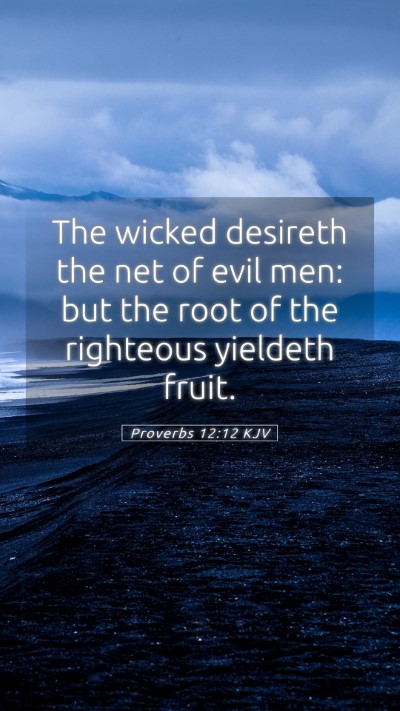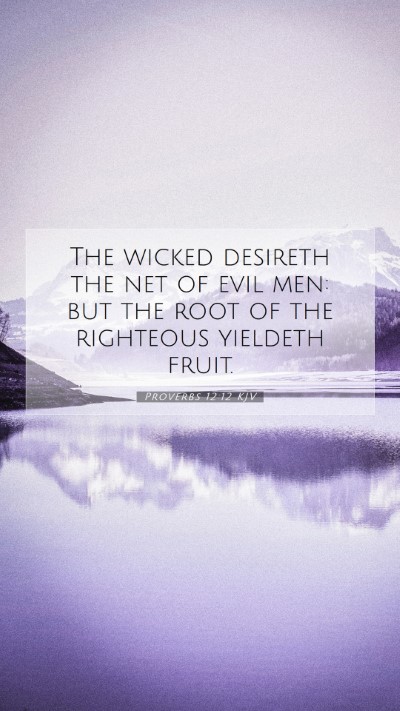Understanding Proverbs 12:12
Proverbs 12:12 states: "The wicked desireth the net of evil men: but the root of the righteous yieldeth fruit." This verse encapsulates the contrast between the wicked and the righteous, illustrating their differing pursuits and the outcomes of their lives.
Meaning of Proverbs 12:12
This verse presents a vivid image of two types of individuals and their motivations in life:
- The Wicked: The "wicked" or those who live unrighteously are portrayed as desiring the methods and results associated with evil. They are driven by selfish ambitions and material gain, often at the expense of morality and societal well-being.
- The Righteous: In contrast, the "root of the righteous” refers to those grounded in virtue and faith. They not only seek good for themselves but also produce positive outcomes that benefit others, symbolizing stability and growth.
Biblical Exegesis
This examination draws insight from various public domain commentaries:
Matthew Henry’s Commentary
Henry characterizes the desires of the wicked as inherently unfulfilling, noting that their pursuit of evil is analogous to chasing after fleeting pleasures without lasting satisfaction. He emphasizes that the righteous, by nature of their faith, find their roots in something substantial and life-giving, leading to fruitful outcomes. Henry also reflects on the metaphor of "root," encouraging believers to nurture their spiritual foundation to yield good works.
Albert Barnes’ Notes
Barnes expands on the implications of “desireth the net of evil men,” discussing how the wicked are often ensnared by their ambition to partake in morally corrupt endeavors. Their desires, while momentarily gratifying, ultimately lead to destruction. On the other hand, he eloquently portrays the "root of the righteous" as a source of stability and sustenance, capable of leading to both personal and communal flourishing.
Adam Clarke’s Commentary
Clarke interprets the verse within the context of wisdom literature. He suggests that the pursuit of evil not only reflects a deeper spiritual malaise but also leads individuals away from their true purpose. Clarke juxtaposes this with the productive nature of the righteous, reinforcing the idea that a virtuous life results in genuine satisfaction and benevolence in society.
Applications of Proverbs 12:12
When considering how to apply Proverbs 12:12 to daily life:
- Reflect on personal desires and motivations: Are they aligned with righteousness or influenced by wicked pursuits?
- Nurture the "root" of faith: Engage in spiritual practices that strengthen one’s connection to righteousness.
- Seek community support in Bible study groups: Discuss insights and share experiences related to the challenges of pursuing righteousness in a world filled with temptations.
Cross References
Related verses that enhance the understanding of Proverbs 12:12 include:
- Jeremiah 17:8: "For he shall be as a tree planted by the waters, and that spreadeth out her roots by the river..."
- Matthew 7:17-19: "Even so every good tree bringeth forth good fruit; but a corrupt tree bringeth forth evil fruit."
- Galatians 5:22-23: "But the fruit of the Spirit is love, joy, peace, longsuffering, gentleness, goodness, faith..."
In Conclusion
Proverbs 12:12 serves as a profound reminder of the importance of choosing righteousness over wickedness. By embedding oneself in the virtues represented in this verse, devotees of Scripture can lead lives that are not only fruitful for themselves but beneficial for their communities. The invitation to explore bible study insights regarding this verse can enhance understanding and personal application.


